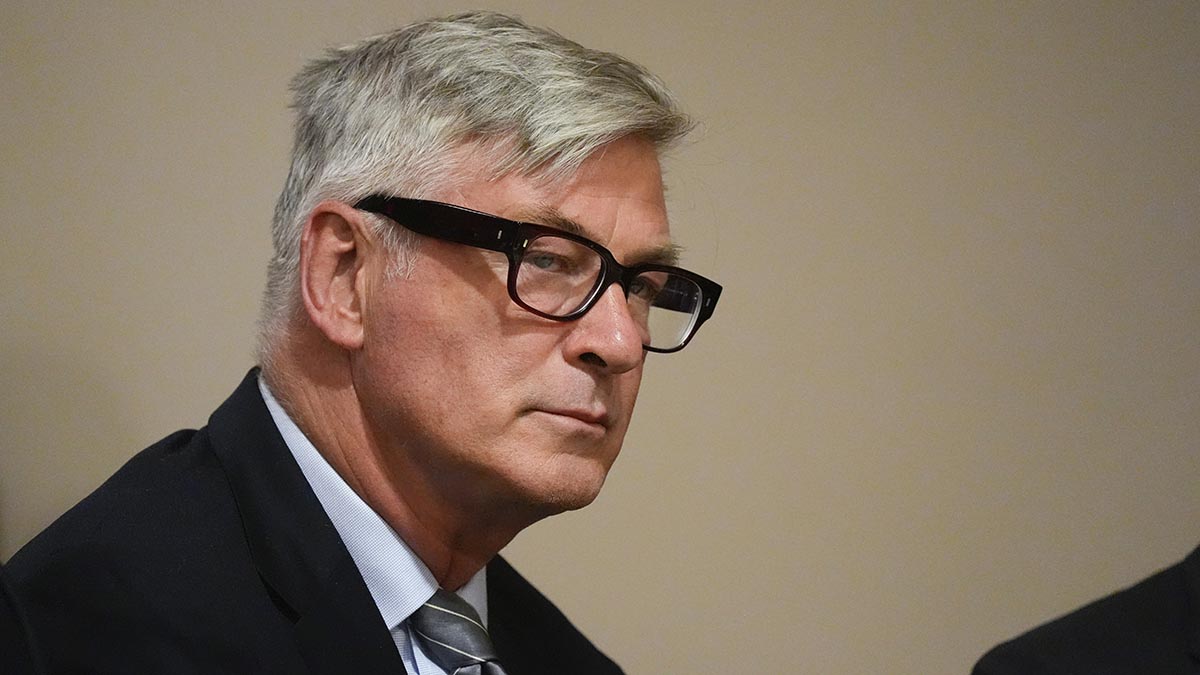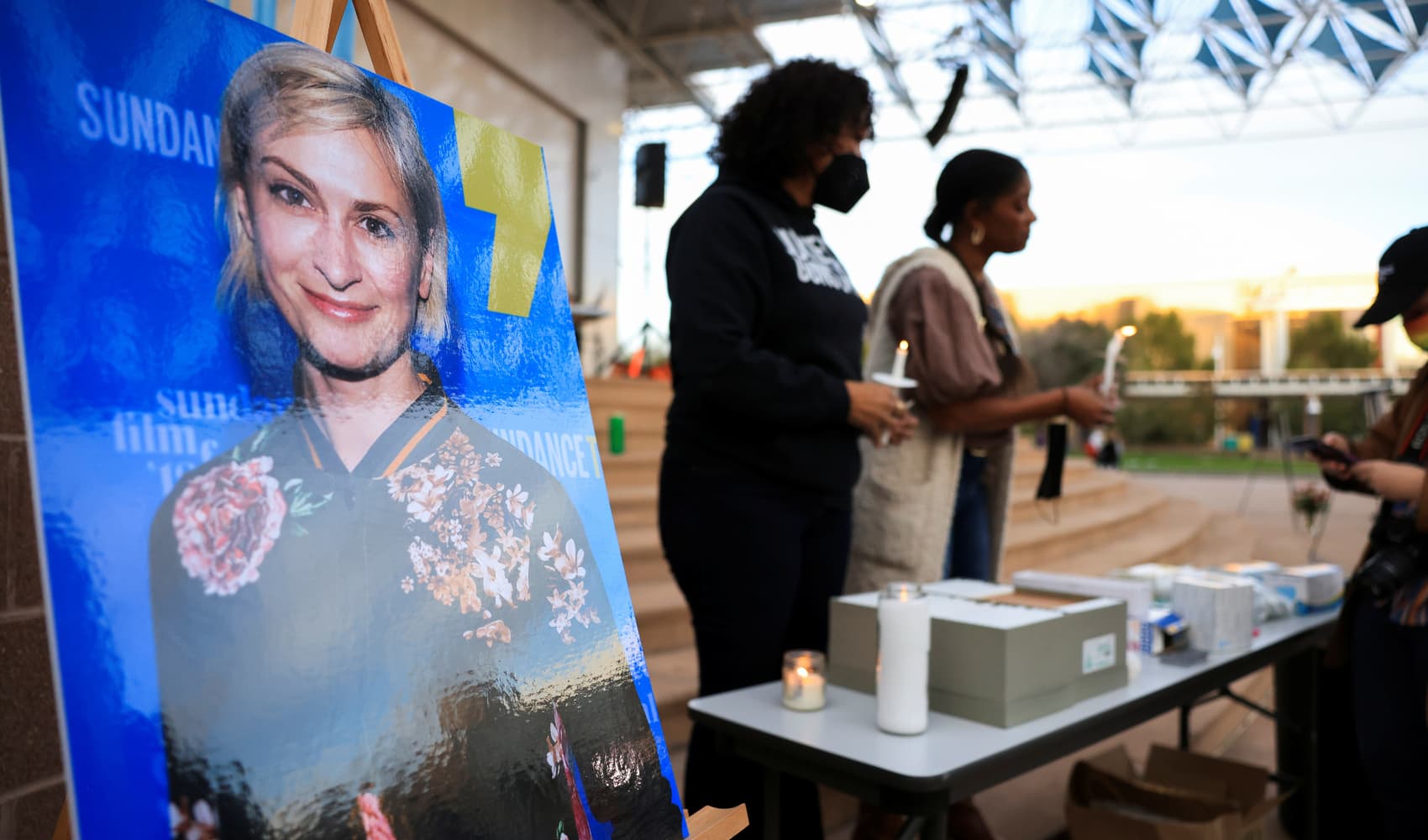Alec Baldwin's defense attorney questioned a crime scene technician over what he suggested were shoddy and subpar searches for the live ammunition that ended up in the actor's revolver and killed cinematographer Halyna Hutchins.
On the second day of Baldwin's New Mexico involuntary manslaughter trial, Judge Mary Marlowe Sommer sided with the prosecution in letting in key statements from the actor that demonstrate his knowledge of guns and the impact of blanks.
WATCH ANYTIME FOR FREE
>Stream NBC10 Boston news for free, 24/7, wherever you are. |
Earlier, Alex Spiro grilled Santa Fe County sheriff's technician Marissa Poppell in particular over search warrants served on a prop truck a week after the death of Hutchins on the set of the movie “Rust,” and on a prop warehouse more than a month after her shooting.
The questions eventually led to Spiro asking Poppell whether police and prosecutors "were just trying to get this over with so that prosecutors could focus on Alec Baldwin?”
Get updates on what's happening in Boston to your inbox. Sign up for our >News Headlines newsletter.
“No,” she answered.
In assertions that would be hotly disputed and dismissed by the prosecution, defense questioning mostly centered on the searches of Seth Kenney's warehouse and a prop truck where his guns were kept in a safe. He is an Albuquerque-based ammunition and weapons supplier to “Rust,” who forged a cooperative relationship with investigators in the immediate aftermath of the fatal shooting.
Spiro suggested that relationship may have been too close.
“There was a witness there who assisted in the search,” Spiro said when asking about the warrant served on the truck. “A man named Seth Kenney. And not only did he assist, he actually was the one that opened the safe.”
“Yes, he had the combination to it,” Poppell said.
Spiro asked, "Why did law enforcement wait a week to go to the prop truck?"
“The search warrant needed to be written,” Poppell replied. “I’m not sure why the time difference exactly.”
Spiro responded that a search warrant for the church building set where the shooting took place was obtained in a day.
“If you can do a search warrant in one day for one thing why does it take seven days for something else?”
Spiro asked Poppell, who found a half-dozen live rounds on the set, if she was surprised to find none in the truck.
“Not necessarily,” she said.
“You’re finding these live rounds all over the set, right?” Spiro asked. Poppell replied yes.
“You go a week later to the prop truck, which has all the ammunition right?” Spiro asked. “And there’s not a single live round there, right?”
Poppell replied “yes” to both.
“Let me ask you something,” the attorney said eventually. “At any point did you become suspicious of Seth Kenney?”
Poppell answered, “No.”
Kenney has not been charged with any wrongdoing. An email sent to his attorney seeking comment was not immediately returned.
Special prosecutor Kari Morrissey in her redirect questioning of Poppell sought to render irrelevant the defendant's approach by asking whether Alec Baldwin was charged with involuntary manslaughter because he brought live rounds onto the set or loaded them into his gun. Poppell answered “no” to both.
Poppell agreed there was evidence that Hannah Gutierrez-Reed — the film's armorer who has already been convicted of involuntary manslaughter in the shooting — had brought the ammunition, which she said was given to her by her father.
Morrissey's defense of Kenney's role extended into her questioning of the case's lead detective, sheriff's Cpl. Alexandria Hancock, who testified briefly at the end of the day and will likely be on the stand for much of Friday.
“Did you ever discover any evidence throughout your entire investigation that Seth Kenney supplied live rounds to the set of ‘Rust?’” Morrissey asked. Hancock said no.
The prosecution was especially contemptuous of defense questions to Poppell about bullets brought into the sheriff's department after the Gutierrez-Reed trial earlier this year by a good Samaritan who said the ammunition was the source of the round that killed Hutchins and that Kenney had duped authorities.
Spiro said that Poppell had “buried” this evidence and it had not been shared with the defense in either Baldwin's case or that of Gutierrez-Reed.
Morrissey established in her questioning that the source of the ammunition was Troy Teske, a friend of Gutierrez-Reed's father, and despite similarities was not the same size as the live rounds found on the “Rust” set, including the one that killed Hutchins.
“The ammunition that the good Samaritan Mr. Teske, close friend of Hannah Gutierrez's dad, brought to you after her conviction do you still have it?”
Poppell replied yes.
“You could bring it in here and show it to the jury and they could see for themselves that it does not match the live ammunition from the set of ‘Rust?’”
Yes, the technician answered.
Spiro got Poppell to testify that it could be very difficult to tell the difference between dummy rounds made to appear as onscreen ammunition that were used on the set, and the live rounds that turned the set fatal.
It was an attempt to push back against the key assertion of prosecutors' case: that Baldwin recklessly flouted gun safety.
Hutchins’ death and the wounding of director Joel Souza nearly three years ago sent shock waves through the film industry. The fatal shooting led to the felony involuntary manslaughter charge against Baldwin, the 66-year-old star of “30 Rock” and frequent host of “Saturday Night Live,” that could result in up to 18 months in prison.
His wife Hilaria Baldwin, younger brother Stephen Baldwin and older sister Elizabeth Keuchler sat behind him in the gallery for each of the first two days.
___
Dalton reported from Los Angeles.



